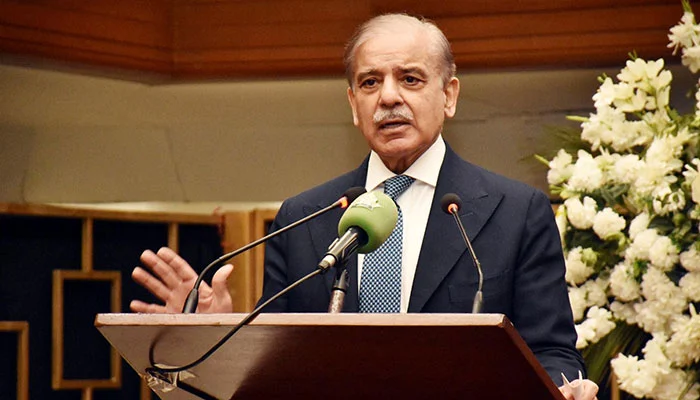PM Shehbaz Sharif: Taxes Hindering Businesses, But IMF Commitments Must Be Honored
KARACHI: Prime Minister Shehbaz Sharif acknowledged the challenges businesses face due to high taxation rates but emphasized the importance of fulfilling Pakistan’s commitments to the International Monetary Fund (IMF). Speaking at a ceremony at the Pakistan Stock Exchange (PSX), the premier reiterated that while the country remains tied to IMF agreements, exiting the programme will only be considered at the right time.
Key Highlights from the Address
- Economic Stabilization and Growth:
The PM hailed the macroeconomic stability achieved and pledged to transform it into sustainable growth through prudent resource management. He urged collaboration between the government and business leaders for export-led growth. - Interest Rate Cuts and Tax-to-GDP Ratio:
He noted the State Bank of Pakistan’s (SBP) policy rate reduction from 22% to 13% but acknowledged a need for further cuts to enhance investment. Pakistan’s tax-to-GDP ratio reached 10.8%, slightly surpassing IMF targets. - Investment in Natural Resources:
Drawing parallels with Saudi Arabia’s oil reserves, the PM pointed to Pakistan’s untapped mineral wealth as a foundation for future growth.
Privatisation and Reforms
The premier cited transparency in privatization efforts, including Pakistan International Airlines (PIA) and Islamabad International Airport. He highlighted ongoing reforms to strengthen public institutions and bolster investor confidence.
Faceless Customs Assessment System
At the South Asia Terminals Pakistan (SAPT), Shehbaz launched a digital customs system aimed at reducing goods clearance times from 42 to 19 hours, with a target of 12 hours. He lauded young Customs officers for their achievements, emphasizing technology-driven reforms.
Economic Outlook
Deputy Prime Minister Ishaq Dar reflected on the long-term impact of market integration and credited the government’s reforms for preventing economic collapse. Finance Minister Muhammad Aurangzeb highlighted improved macroeconomic indicators and reduced debt burdens following the IMF agreement.
Healthcare and AKU Clinical Practice Guidelines
Shehbaz praised the Aga Khan University for its manual of clinical guidelines, emphasizing the government’s commitment to improving healthcare. He acknowledged systemic challenges, including access to quality care and workforce shortages, and called for stronger partnerships to elevate health standards.
Conclusion
The PM reiterated the government’s commitment to economic reform, technological integration, and investment-friendly policies. He welcomed recommendations from the business community to address structural issues and drive sustainable economic progress.




